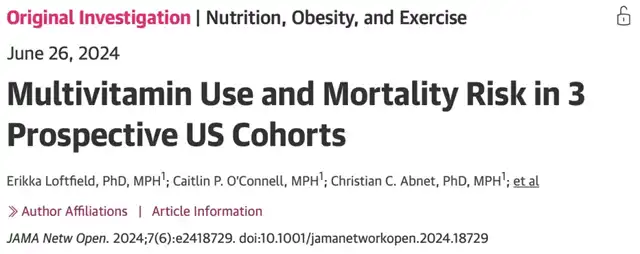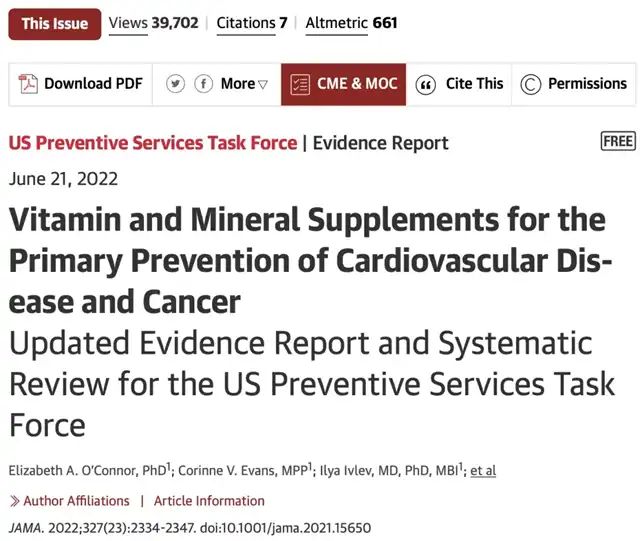Taking Multivitamins May Increase Mortality Rates?
- Lamivudine Resistance May Persist for Years in People with HIV
- World Most Expensive Drug Sets New Record: $4.25 Million Per Dose
- Parasite Found in Sea Urchin’s Mouth: Still Safe to Eat?
- Breast Cancer Exploits Neural Signaling Pathways to Bypass Blood-Brain Barrier and Invade the Brain
- Dispute Intensifies: Moderna Achieves Partial Victory in mRNA Patent Battle with BioNTech and Pfizer
- Harvard Study Finds Semaglutide May Increase Risk of Blindness
Taking Multivitamins May Increase Mortality Rates?
- Chinese-made Drug Enters Australia: Causing at Least 20 Deaths!
- How serious is Japan’s “flesh-eating bacteria” problem?
- Taiwan 6th wave of COVID outbreak: 623 confirmed cases in one week and 38 deaths
- FDA has mandated a top-level black box warning for all marketed CAR-T therapies
- Can people with high blood pressure eat peanuts?
- What is the difference between dopamine and dobutamine?
- How long can the patient live after heart stent surgery?
Taking Multivitamins May Increase Mortality Rates?
JAMA: Don’t Take Them Lightly! A 20-Year Follow-Up Shows a 4% Increase in All-Cause Mortality Risk from Daily Use.
Vitamins are one of the six essential nutrients needed by the human body and are crucial for maintaining normal life and health. For most vitamins, the body cannot synthesize them directly or does so in insufficient quantities, making dietary intake or direct supplementation necessary to meet the body’s needs. As awareness of nutrition has grown, people have increasingly recognized the importance of vitamins, often turning to supplements rather than relying solely on natural food sources.
Data speaks volumes—China’s market for vitamins and dietary supplements saw a staggering growth rate of 9.4% in 2021, far outpacing the global growth rate of 3.4%. In the United States, nearly one-third of people take multivitamins, with higher usage rates among the elderly, women, and those with a college education.
Many readers or their family members may be taking vitamin supplements without knowing whether they truly need them or which specific vitamins they might be lacking. They may purchase various multivitamins or health products simply because others do, believing that this will make them healthier.
But what are the actual health benefits of taking multivitamins regularly? Are they a necessity or just a placebo?
A recent study published in a JAMA journal tracked nearly 400,000 participants over more than 20 years and found that daily use of multivitamins does not lower all-cause mortality rates; in fact, it increases the risk by 4%. This suggests that expensive multivitamins might be nothing more than a placebo, failing to effectively extend lifespan.

Research Details
The study gathered data from three major cohorts: the NIH-AARP Diet and Health Study, the Prostate, Lung, Colorectal, and Ovarian (PLCO) Cancer Screening Trial, and the Agricultural Health Study (AHS). The study included 390,124 participants, with 164,762 deaths recorded during the follow-up period. Among these, 49,836 died from cancer, 35,060 from heart disease, and 9,275 from cerebrovascular disease.
Participants were asked to complete questionnaires about their supplement use. The median age of users and non-users was similar, but daily multivitamin users were more likely to be female and have a college education. They also had lower BMIs and better dietary quality. Surprisingly, the study found that daily multivitamin users had a 4% higher risk of all-cause mortality compared to non-users, making multivitamins appear to be a “catalyst for death.” However, there was no significant difference in death risks from heart disease, cancer, or cerebrovascular diseases between the two groups, further supporting the idea that multivitamins might function as a placebo.
Additional Findings
Stratified analysis revealed that individuals under 55 years old who took daily multivitamins had a 15% higher mortality risk compared to non-users. Smoking status and BMI did not significantly affect the outcomes.
In conclusion, for generally healthy individuals, daily multivitamin use does not extend life and may even increase mortality risk by 4%. Therefore, it’s crucial to choose multivitamins based on individual health needs to avoid counterproductive outcomes.
A 2022 JAMA review by the US Preventive Services Task Force (USPSTF) similarly emphasized that vitamin and mineral supplements provide little benefit in preventing cancer, cardiovascular disease, and death. In some cases, excessive vitamin intake may even increase cancer risk.

Key Points from the USPSTF Review
-
Multivitamin Supplements: No significant effect on reducing all-cause mortality, cardiovascular disease, or cancer prevention.
-
Beta-Carotene: Increased risk of cardiovascular disease by 10% and lung cancer by 20%.
-
Vitamin E: No effect on preventing all-cause mortality, cardiovascular disease, or cancer.
-
Vitamin D and Calcium: These common supplements did not show significant benefits in reducing mortality, cardiovascular disease, or cancer risks. Overuse could lead to kidney stones.
These studies remind us that for healthy adults without known nutrient deficiencies, the belief that “supplements = health” is misguided. A balanced diet is far more important. If you suspect a nutrient deficiency, consult a healthcare provider before starting any supplements to avoid adverse effects.
Taking Multivitamins May Increase Mortality Rates?
References:
[1]Loftfield E, O’Connell CP, Abnet CC, Graubard BI, Liao LM, Beane Freeman LE, Hofmann JN, Freedman ND, Sinha R. Multivitamin Use and Mortality Risk in 3 Prospective US Cohorts. JAMA Netw Open. 2024 Jun 3;7(6):e2418729. doi: 10.1001/jamanetworkopen.2024.18729. PMID: 38922615; PMCID: PMC11208972.
[2]US Preventive Services Task Force. Vitamin, Mineral, and Multivitamin Supplementation to Prevent Cardiovascular Disease and Cancer: US Preventive Services Task Force Recommendation Statement. JAMA. 2022;327(23):2326–2333. doi:10.1001/jama.2022.8970
(source:internet, reference only)
Disclaimer of medicaltrend.org
Important Note: The information provided is for informational purposes only and should not be considered as medical advice.



